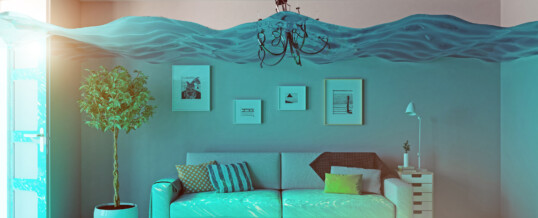
Maybe your basement has taken on water? Perhaps it smells musty? Or, maybe it’s got mold growing in it?
In any of these cases, basement waterproofing could have saved you a lot of grief. “Should I waterproof my basement?“, you ask. Generally speaking, it’s the right decision.
Without further ado, here is why you should install a basement waterproofing system.
What Can Happen if You Don’t Waterproof Your Basement?
First, you might be wondering what can happen if you don’t waterproof your basement. The answer is, well, a number of things. In particular, water can enter your basement, causing a variety of issues in the process. We’ll discuss those issues in detail below.
Flooding
The worst thing that can happen as a result of not waterproofing your basement is that your basement can flood. Groundwater can wear down your foundation, causing cracks to form. Then, this water can make its way through said cracks, resulting in it accumulating on the ground below.
If you have possessions stored in your basement, these possessions can be ruined by the flooding. Even if you don’t have possessions in your basement, the water can cause additional cracking as well as problems like mold growth.
Mold Growth
We just mentioned it and we’re going to mention it again: mold growth. A non-waterproofed basement is particularly prone to mold growth.
See, mold loves water. Where water ends up, mold eventually ends up there as well. And it doesn’t take a full-on flood to attract mold; even a small amount of water can cause mold spores to flock.
The problem with mold isn’t just an aesthetic one. Mold can lead to allergies as well, resulting in excess coughing and sneezing as well as a sore throat and watery, red eyes.
In short, you don’t want mold in your basement. Fortunately, you can help keep it at bay with the use of a basement waterproofing system.
Musty Smells
Not only does standing water attract mold spores but musty smells as well. So, if you don’t waterproof your basement, there’s a good chance that your basement will take on a pungent and unpleasant aroma fairly soon.
Foundational Deterioration
The whole reason that basement waterproofing exists is hydrostatic pressure. This is the concept of water pushing against a surface that’s blocking its way. In the case of basements, home foundations are blocking groundwater, thus forcing it to collect and apply increasingly more pressure against the outside of the basement.
What happens eventually is that the foundation can no longer take the stress. As a result, it cracks. If this is allowed to happen over time, the basement can incur hundreds of cracks, greatly compromising the foundational deterioration of the home.
In some cases, the foundation can even start to cave in on itself. This can cost thousands of dollars to repair.
Fortunately, there’s a way to counteract this problem. You can install a sump pump. The sump pump will pump water away from the outside of your home, thus greatly reducing the amount of pressure that exists on the outside of your foundation.
The Benefits of Basement Waterproofing
There are many benefits of basement waterproofing, most of which involve avoiding the above-reviewed effects. In helping you to do so, basement waterproofing systems allow you to finish your basement, complete with carpet, furniture, and electronics.
If you don’t waterproof your basement, it will forever be vulnerable to flooding and related issues. This would make it an inappropriate room to finish and — truth be told — an inappropriate room to even store items in.
Basement Waterproofing Methods
There are a number of methods used to waterproof basements. You don’t have to use all of these, though, the more you use, the more protected your basement will be. Some of the most prominent of these methods include the following.
Sump Pump Installation
The sump pump is the crown jewel of any basement waterproofing system. It actively keeps groundwater levels down, reducing hydrostatic pressure around the home’s foundation, and lowering the risk of foundation cracks. The sump pump will kick into gear any time that flooding is a possibility, thus saving your basement from disaster.
Drain Tile Installation
Another way to reduce groundwater levels around a house is to lay down drain tiles. Drain tiles are small pipes that you bury underground. Drain tiles catch water as it makes contact with them and then move that water to a spot further away from the home. In doing so, they reduce hydrostatic pressure against the home’s foundation, thus greatly lowering the risk of groundwater entering the basement.
Foundation Crack Repair
Regardless of what you do to reduce hydrostatic pressure, cracks will still form in your foundation. As such, if you want to keep your basement protected from water, you’ll need to patch up your foundation cracks from time to time.
Not only will foundation crack repair prevent water from coming into your basement, but it will also sure up the structural integrity of your home as a whole.
Wall Liner Installation
One last method for basement waterproofing is wall liner installation. This involves placing a waterproof liner on the inside of a basement wall. The liner catches groundwater and then redirects it away from the home.
This is a great supplement to regular foundation crack repair. It’s a reliable line of defense that will serve to keep your basement dry for years to come.
Interested in Installing a Basement Waterproofing System in Baltimore?
What do you think? Are you interested in installing a basement waterproofing system? If so and if you’re in the Baltimore, Maryland area, we here at Armored Basement Waterproofing have you covered.
We offer all kinds of basement waterproofing services, from foundation crack repair to sump pump installation to drain tile installation and more.
Contact us now to discuss your needs!
ShareMAY
